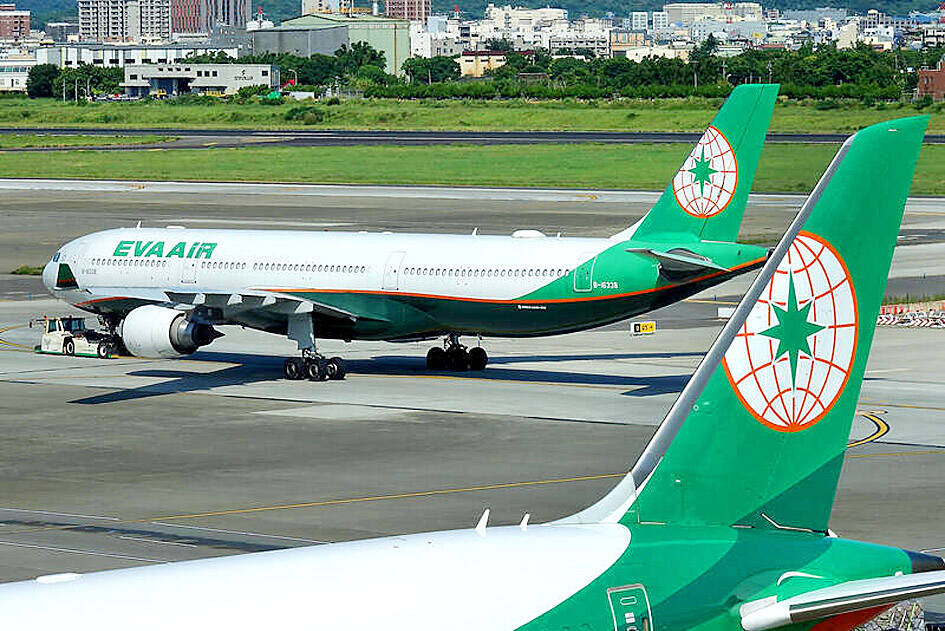Airbus SE said yesterday that Taiwan’s EVA Airways Corp (長榮航空) has finalized an order for 33 planes from the European aircraft maker, including 18 long-range A350-1000 planes and 15 single-aisle A321neo models.
Airbus did not provide a figure, but the deal could be worth as much as US$8.5 billion under catalog prices that the aerospace giant has not updated since 2018.
Airbus said that it has more than 1,000 firm orders from 60 customers worldwide for its A350 models. The wide-bodied A350-1000 type can seat up to 410 passengers and travel up to 18,000 kilometers non-stop.

Photo: Taipei Times file photo
“The A350 is setting new standards across the board in terms of range, payload, fuel efficiency and passenger comfort,” Airbus executive vice president for sales and commercial aircraft Benoit de Saint-Exupery said in a statement.
The A321neo, part of the A320neo family, has received more than 5,600 orders since its launch in 2016.
“In both size categories we have selected the most modern and fuel-efficient types, that offer the highest levels of passenger comfort,” EVA Airways president Clay Sun (孫嘉明) said in the Airbus statement. “The aircraft also bring significant reductions in carbon emissions, which is in line with our company’s sustainability goals.”
Founded in 1989, EVA Airways has a fleet of 86 planes. It carried 2.2 million passengers in 2022.
The airline serves 61 destinations over four continents, not including Africa, according to its Web site.

Zhang Yazhou was sitting in the passenger seat of her Tesla Model 3 when she said she heard her father’s panicked voice: The brakes do not work. Approaching a red light, her father swerved around two cars before plowing into a sport utility vehicle and a sedan, and crashing into a large concrete barrier. Stunned, Zhang gazed at the deflating airbag in front of her. She could never have imagined what was to come: Tesla Inc sued her for defamation for complaining publicly about the vehicles brakes — and won. A Chinese court ordered Zhang to pay more than US$23,000 in

Taiwan Semiconductor Manufacturing Co (TSMC, 台積電) yesterday said that its investment plan in Arizona is going according to schedule, following a local media report claiming that the company is planning to break ground on its third wafer fab in the US in June. In a statement, TSMC said it does not comment on market speculation, but that its investments in Arizona are proceeding well. TSMC is investing more than US$65 billion in Arizona to build three advanced wafer fabs. The first one has started production using the 4-nanometer (nm) process, while the second one would start mass production using the

A TAIWAN DEAL: TSMC is in early talks to fully operate Intel’s US semiconductor factories in a deal first raised by Trump officials, but Intel’s interest is uncertain Broadcom Inc has had informal talks with its advisers about making a bid for Intel Corp’s chip-design and marketing business, the Wall Street Journal reported, citing people familiar with the matter. Nothing has been submitted to Intel and Broadcom could decide not to pursue a deal, according to the Journal. Bloomberg News earlier reported that Taiwan Semiconductor Manufacturing Co (TSMC, 台積電) is in early talks for a controlling stake in Intel’s factories at the request of officials at US President Donald Trump’s administration, as the president looks to boost US manufacturing and maintain the country’s leadership in critical technologies. Trump officials raised the

From George Clooney to LeBron James, celebrities in the US have cashed in on tequila’s soaring popularity, but in Mexico, producers of the agave plant used to make the country’s most famous liquor are nursing a nasty hangover. Instead of bringing a long period of prosperity for farmers of the spiky succulent, the tequila boom has created a supply glut that sent agave prices slumping. Mexican tequila exports surged from 224 million liters in 2018 to a record 402 million last year, according to the Tequila Regulatory Council, which oversees qualification for the internationally recognized denomination of origin label. The US, Germany, Spain,